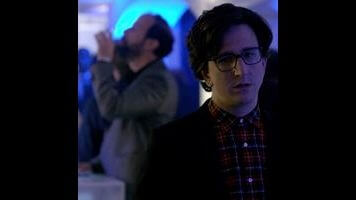Love’s 2nd-season hot streak continues at an illuminating “Work Party”

Is Love the first Netflix original series to generate more heat with its second season than its first? BoJack Horseman is the only exception I can think of, so maybe Love is the first live-action Netflix original whose second season was received more warmly than its first. (In the questionably accurate metric of “looking at my Twitter feed,” at least, the second act of Mickey and Gus’ relationship has created a greater amount of chatter among critics and casual viewers alike.) The typical arc for the streaming service’s offerings is a bit like the story of Bertie and Randy: There’s that initial spark and a lot of passion at first, but after a while, the flaws start to show, and the next thing you know you’re at your roommate’s work party realizing you’ve made a significant and foolhardy investment in House Of Cards, and you’re never getting it back. The reaction to Love is more like Mickey and Gus, hesitant flirtations followed by a more sincere commitment as time goes on.
It helps that the second season is genuinely an improvement on a first season that, at least in this critic’s eyes, was pretty good to begin with. Relying on the different types of sparks that fly between Gillian Jacobs and Paul Rust while creating new and interesting places for those sparks to fly—and making them fly around an increasingly defined supporting cast—Love has truly upped its game this year.
Building on the precedent set in the John Slattery-helmed “Party In The Hills,” “The Work Party” uses a raucous and anxiety-inducing gathering to burrow deeper into the characters and their relationships. It’s essentially a series of conversations in the same large room, but let’s not underestimate the amount of work that must go in to orchestrating something that genuinely resembles a wasteful back-patting session commemorating the merger of two media entities. Even the extras are working their asses off here.
The last time Mickey’s and Gus’ work and personal lives collided, it didn’t go so well. “The Work Party” ups the stakes by putting Mickey’s job on the line. As explained by Erika (Paula Pell, whose panicked boss character has become another in Love’s deep arsenal of secret weapons), the West Coast/East Coast marriage of Gravity Satellite Radio and Subzero Satellite Radio means some of the L.A. team is bound to get sacked. They have to make a good impression on the Subzero guys (and Erika makes a real point about them being guys) if they’re going to stay employed, and Mickey’s not exactly the best at making first impressions. Recall that we met her on the stage of a new-age church she mistook for a club.
At the center of Mickey’s insecurities is this worry that she’s a fuckup, and that brings a winning ferociousness out of Jacobs. At this party, the two things that are precious to Mickey—a good job in broadcasting and a promising relationship with a more-or-less good guy—are threatened, and it’s a joy to watch Jacobs go into protection mode. Confronting Dr. Greg in front of the fire pit, she goes toe-to-toe with one of the best screamers in the biz (and Brett Gelman’s already blown one spectacular gasket pre-credits), really feeling something Mickey’s probably not ready to admit to Gus: “He’s the best thing I have going in my life right now.” The costuming for their throw-down is a nice touch, too, the crocheted details of her dress peeking out from under her motorcycle jacket, a juxtaposition of vulnerability and toughness.
Dr. Greg’s a real bastard in this one, with Gelman playing the James Spader at the Pretty In Pink prom of “The Work Party.” He even gets a classic movie-bully moment at the bar, a little rack focus where the smugness of Greg’s “It’s sexual!” blurts out, and a crestfallen Gus comes sharply into view. The rant that follows is more Dr. Greg bullshit, but its precision and power speak to why he has the job he has—even if he is a fake doctor, like Dr. Phil. (Cue a distraught Gus: “Dr. Phil isn’t a real doctor?”) Talking and listening are very important in “The Work Party,” and in these varied configurations, the characters get to work out things they might not say to other people. Mickey acknowledges her feelings for Gus, Dr. Greg isn’t such a dick when he’s just palling around with Gus, and Bertie and Chris both come to uncomfortable conclusions about their lives. I kind of want Bertie and Chris to hook up now, but I also don’t want Bertie to rush into something all over again. Among the most interesting things we learn in “The Work Party” (sorry, Erika’s nephews, you missed the cut) is that Chris’ service-industry experience makes him just as qualified as Dr. Greg to lend an ear and dish out advice. He’ll need to work on the clarity of his messaging, though: “Chris Czajkowski. It’s spelled just like it sounds: “C-Z-A-J-K-owskee.”
The talking helps, but it doesn’t necessarily make anybody feel better. Dr. Greg uses his words as weapons, and Bertie and Chris’ conversation leaves both feeling worse for the wear. (Understatement of the year: “Great party.”) When Mickey finds Gus on that couch, it sets up another difficult exchange. Like Mickey with the Subzero bros (SubzerBros?), Gus’ cocktail-party chatter just managed to confirm his anxieties. But when Jacobs returns to the frame, she brings the hand-percussion intro from George Michael’s “Freedom! ’90” with her, and that groove is a promise that must be fulfilled. The chatter dies down, the dancing begins, and though Gus and Mickey are denied the unbeatable release of the song’s hook, that slice of guitar-and-jukebox-detonating gospel carries us forward, a little bit of celebration before one of season two’s most downbeat installments.